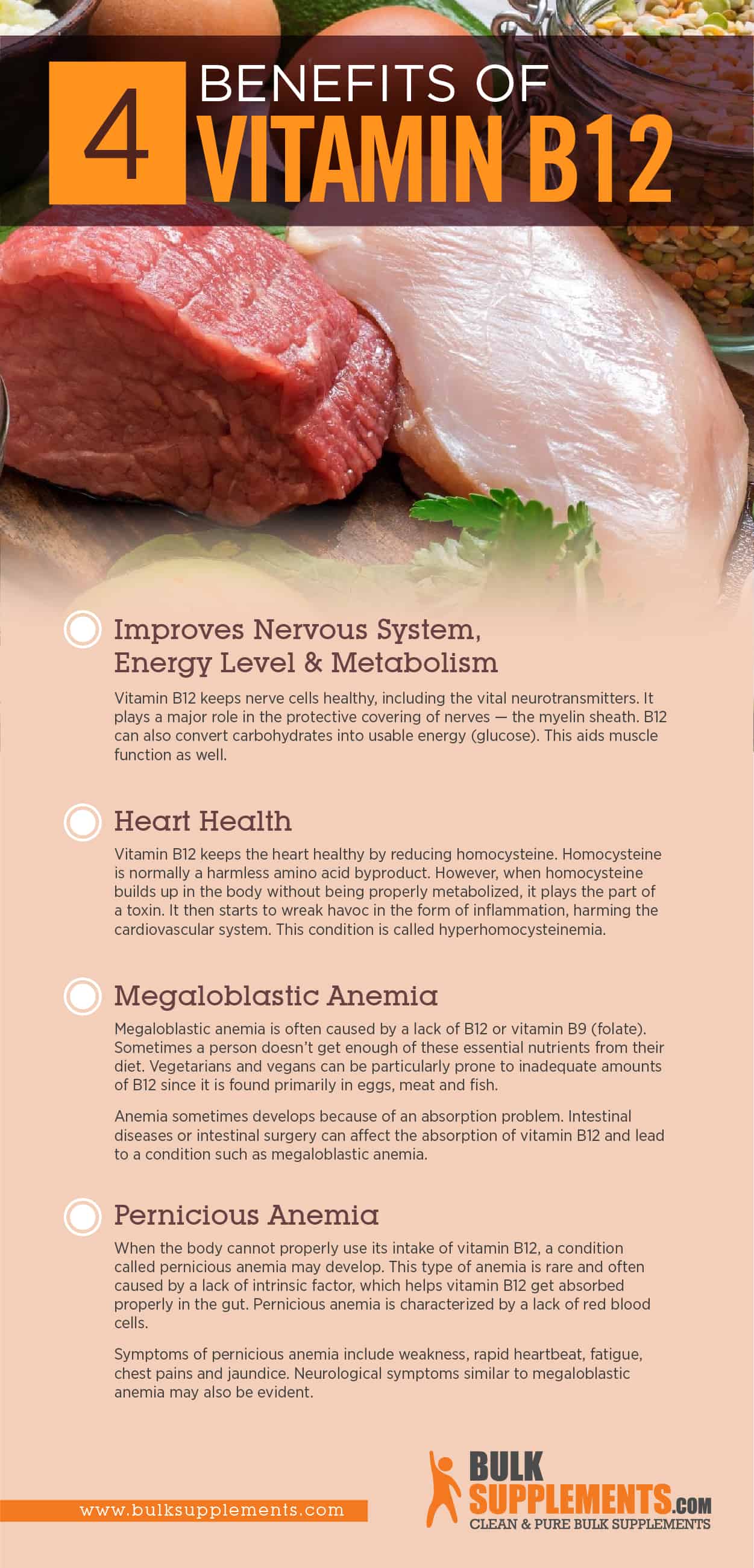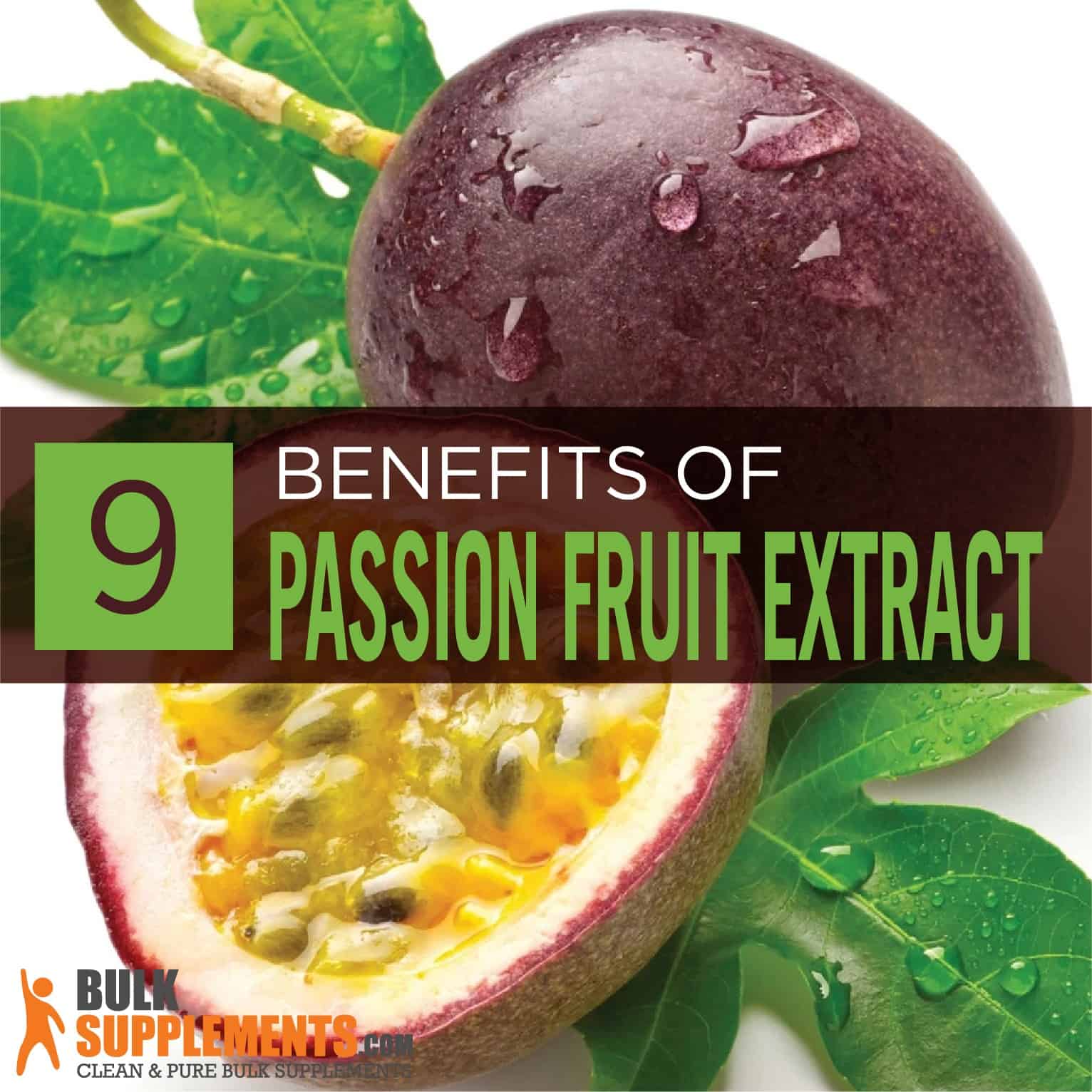Vitamin B12: Benefits, Side Effects & Dosage
by James Denlinger Digital Marketing StrategistWhat is Vitamin B12?
Vitamin B12, a water-soluble vitamin, is abundantly present in meat, fish, eggs and dairy products. While vitamin B12 keeps our cardiovascular system healthy, it can also keep our nerves protected and our metabolism working smoothly. It prevents certain types of anemia and gives us the boost of daily energy we need.
But some individuals don’t get enough B12 — or have trouble assimilating it. This can result in a vitamin B12 deficiency, which leads to poor health. Absorbing B12 starts in the stomach, where hydrochloric acid separates it from its attached proteins. Next, B12 combines with a different protein called intrinsic factor. The body can then absorb it into the small intestine for use.
Vitamin B12 has many functions, as well as a few different names…
Methylcobalamin vs. Cyanocobalamin
B12 contains the mineral cobalt, so any form of it is part of the family of “cobalamins.”
- Methylcobalamin is the scientific term for the vitamin B12 we get from foods
- Cyanocobalamin is the synthetic form of vitamin B12, only found in supplements
Both containing a cobalt ion, methylcobalamin and cyanocobalamin show similarities in structure. However, their attached molecules differ, making a difference in how the body absorbs them. Cyanocobalamin is more common in supplements because it is slightly more stable and less expensive than other forms of B12. The body may also absorb cyanocobalamin better than methylcobalamin, though methylcobalamin has more retaining power.
Although each type of B12 has distinctly different qualities, both have benefits for our health, and both types can prevent a deficiency.
In one report, both methylcobalamin and a supplement containing cyanocobalamin effectively reduced symptoms that lead to nerve damage in diabetics. Animal studies also confirm that each form can treat symptoms that affect the nervous system.
The B Vitamin Family
Vitamin B12 is an important member of the B vitamin family. The B vitamins are famous for boosting energy and benefiting the metabolism. Once thought of as a single element, scientists now know that vitamin B is actually a complex assortment of nutrients. The B vitamins are all water-soluble, and the body will flush them out when too much is consumed. The body doesn’t store B vitamins for very long, so we need to eat healthy foods that contain them or supplement with a B complex multivitamin.
Vitamin B12 Benefits
B12, like all of the B vitamins, has its own special talents. Without this important element, the body systems suffer, and when we have it, we enjoy optimum health.
Improves Nervous System, Energy Level & Metabolism
Vitamin B12 keeps nerve cells healthy, including the vital neurotransmitters. It plays a major role in the protective covering of nerves — the myelin sheath. B12 can also convert carbohydrates into usable energy (glucose). This aids muscle function as well.
Heart Health
Vitamin B12 keeps the heart healthy by reducing homocysteine. Homocysteine is normally a harmless amino acid byproduct. However, when homocysteine builds up in the body without being properly metabolized, it plays the part of a toxin. It then starts to wreak havoc in the form of inflammation, harming the cardiovascular system. This condition is called hyperhomocysteinemia.
So, who is at risk of contracting hyperhomocysteinemia? This involves many factors, including:
- Insufficient amounts of vitamin B12, folate, magnesium and other B vitamins
- Smoking
- Age-related factors
- Coffee drinking
- Alcohol consumption
- Obesity
- Prescription drug use of cholestyramine, colestipol, fenofibrate, levodopa, metformin, methotrexate, niacin, nitrous oxide, pemetrexed, phenytoin and sulfasalazine
- A high-methionine diet
Supplements of vitamin B12, B9 and B6 can all manage symptoms of hyperhomocysteinemia. A patient with hyperhomocysteinemia typically increases intake of foods loaded with vitamin B12 and other B vitamins. When a person’s absorbed intake of vitamin B12 is normal, homocysteine levels are, too.
Megaloblastic Anemia
Megaloblastic anemia is often caused by a lack of B12 or vitamin B9 (folate). Sometimes a person doesn’t get enough of these essential nutrients from their diet. Vegetarians and vegans can be particularly prone to inadequate amounts of B12 since it is found primarily in eggs, meat and fish.
Anemia sometimes develops because of an absorption problem. Intestinal diseases or intestinal surgery can affect the absorption of vitamin B12 and lead to a condition such as megaloblastic anemia.
A vitamin B12 deficiency can show itself in neurological symptoms even before the anemia is diagnosed. These symptoms may include:
- Tingling in hands or feet
- Balance problems
- Vision loss due to optic nerve atrophy
- Mental confusion or memory loss
- Depression
- Insomnia
- Panic attacks
When a vitamin B12 deficiency is the cause of megaloblastic anemia, it can be treated by giving the patient monthly B12 injections or oral supplements of B12.
Pernicious Anemia
When the body cannot properly use its intake of vitamin B12, a condition called pernicious anemia may develop. This type of anemia is rare and often caused by a lack of intrinsic factor, which helps vitamin B12 get absorbed properly in the gut. Pernicious anemia is characterized by a lack of red blood cells.
Symptoms of pernicious anemia include weakness, rapid heartbeat, fatigue, chest pains and jaundice. Neurological symptoms similar to megaloblastic anemia may also be evident.
Pernicious anemia, also called Addison’s anemia, may technically be an autoimmune disorder. The most common cause of pernicious anemia is when the stomach destroys its own cells — the ones that make intrinsic factor. Without the connection with intrinsic factor, the body cannot absorb B12 or create adequate blood cells.
Pernicious anemia was given this ominous name because historically it often resulted in death to the patient. Now, pernicious anemia is easily treated with daily or weekly vitamin B12 shots until the blood levels of vitamin B12 increase.
 PIN IT
PIN ITVitamin B12 Deficiency
Even if someone isn’t struggling with one of the above diseases, they still may be lacking in essential vitamin B12. About 40 percent of people have inadequate levels of vitamin B12. In fact, it’s one of the leading nutrient deficiencies worldwide. Besides serious medical conditions like anemia, a vitamin B12 deficiency can also surface in symptoms like fatigue, low energy, lack of focus and mood swings.
Some groups are particularly prone to a vitamin B12 deficiency.
People with Gastrointestinal Issues
- Individuals with Crohn’s disease, celiac disease, stomach and intestinal disorders may not be absorbing the vitamin B12 they consume
- Surgery in the gastrointestinal area can also cause a person to be vulnerable to a vitamin B12 deficiency — a surgical procedure involving the digestive tract can result in a loss of important cells involved in the absorption of vitamin B12
Older adults
A loss of normal stomach acid secretions can accompany aging. Less stomach acid means more active stomach bacteria. These bacteria use up vitamin B12, leaving less for use throughout the body.
Vegans & Vegetarians
Animal-based products are the most common source of vitamin B12. This is why vegans and vegetarians are more apt to be deficient in vitamin B12. The main plant sources for vitamin B12 are fortified cereals and nutritional yeast.
If pregnant women consume no animal products, the vitamin B12 reserves will be limited. Vitamin B12 is supplied to the baby during pregnancy. If the mother is lacking in vitamin B12, the baby will be, too. Babies can develop vitamin B12 deficiencies, and if left undetected, serious neurological damage can result.
The American Dietic Association recommends supplements of vitamin B12 for vegans and vegetarians during pregnancy and while nursing.
Vitamin B12 in Food
Vegetables contain little or no vitamin B12. You can get most of the vitamin B12 you need by consuming animal products or by taking supplements.
Foods rich in vitamin B12 include:
- Eggs
- Meats
- Poultry
- Yogurt, raw milk and other dairy products
- Fish (especially clams, salmon, herring, tuna and mackerel)
- Beef and chicken liver
- Fortified cereals
Vitamin B12 Supplements
Many people turn to B12 supplements to prevent a deficiency and to meet their needs of this essential nutrient.
Oral supplements may contain cyanocobalamin, the synthetic, absorbable form of vitamin B12. Other supplements contain methylcobalamin. If you eat foods high in B12 and also take a supplement, you may exceed the RDA recommended requirement. A recent study found no toxic effects from an excess of vitamin B12 when the recommended dose was exceeded by healthy adults.
Vitamin B12 Interactions
Some drugs can interfere with the body’s natural assimilation of vitamin B12. These include:
- Aminosalicylic acid – This drug used for digestive problems may inhibit the body’s absorption of vitamin B12
- Colchicine (Colcrys, Mitigare) – This anti-inflammatory drug can treat gout, but it may decrease absorption of vitamin B12
- Metformin (Glumetza, Glucophage, Fortamet) – Typically used for diabetes patients, this drug may reduce absorption of vitamin B12
- Omeprazole (Prilosec), lansoprazole (Prevacid) or other stomach acid-reducing drugs may decrease absorption of vitamin B12
- Vitamin C (ascorbic acid) supplements – Taking vitamin B12 combined with vitamin C may reduce the effectiveness of vitamin B12
Check with your health professional to avoid potential drug interactions.
Vitamin B12 Dosage
The Recommended Daily Allowance (RDA) for vitamin B12 is:
- 2.4 micrograms / day for healthy teens ages 14-18 years
- 2.4 micrograms / day for adults aged 18-50 years
- .9-1.8 micrograms / day for infants and children
- 2.6 micrograms / day for pregnant women
- Vitamin B12 supplements or fortified foods are recommended for adults over age 50
The Bottom Line
Vitamin B12 is right at our fingertips, and on our table — if that table includes meat, dairy, fish, eggs or fortified cereals. It is also available as a supplement in two related forms — methylcobalamin and cyanocobalamin.
B12 plays a key role in creating blood cells and cushioning nerve cells. It helps the body process glucose, fueling us with the energy we need. Like the other helpful B vitamins, vitamin B12 is water-soluble. This makes it difficult to store and easy to absorb. Though some individuals don’t get enough vitamin B12, supplements can help solve this issue. The proper use of this essential nutrient depends on a healthy diet and a good supply of intrinsic factor to process it.
Sponsor Ads
Created on Apr 10th 2020 13:31. Viewed 377 times.




